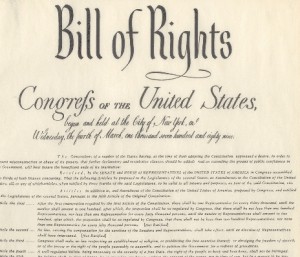Dying Man’s Identification of Killer Admissible: Where Does That Leave the Confrontation Clause?
Recently, the U.S. Supreme Court issued a ruling holding that the statement of a man who had been mortally wounded in a robbery identifying his assailant is admissible in court, to prove that the man he identified is his killer.
This sounds like a sensible result. Considering the facts in a vacuum, why shouldn’t such an identification be admissible in court? It all comes down to the Sixth Amendment’s Confrontation Clause.
The Sixth Amendment to the Constitution, as you probably know, is part of the first ten amendments which are collectively known as the “Bill of Rights,” because they all place very tight restraints on the power of the government to restrict private, individual conduct. It also lays out several protections enjoyed by criminal defendants.
 One of the most important of these protections is found in the Sixth Amendment’s “Confrontation Clause.” Basically, criminal defendants have the right to confront their accusers. This basically means that the person accusing the defendant in a criminal case must show up in court to testify, and make himself available for cross-examination by the defense. The rationale behind this rule is obvious enough: a criminal defendant should be able to ask questions of his accuser, theoretically ensuring that any inaccuracies or contradictions in the accuser’s story can be made known to the jury.
One of the most important of these protections is found in the Sixth Amendment’s “Confrontation Clause.” Basically, criminal defendants have the right to confront their accusers. This basically means that the person accusing the defendant in a criminal case must show up in court to testify, and make himself available for cross-examination by the defense. The rationale behind this rule is obvious enough: a criminal defendant should be able to ask questions of his accuser, theoretically ensuring that any inaccuracies or contradictions in the accuser’s story can be made known to the jury.
However, the application of this right is sometimes complicated by the simple realities of life, and police work. For example, what happens if the victim of a crime gives a lot of information to the police the moment they arrive, leading them to arrest the suspect? Can that information also be used at the defendant’s trial, even though he could not confront his accuser at the time?
The Supreme Court dealt with this issue relatively recently. In 2004, it decided Crawford v. Washington, holding that if a statement to the police is for the purpose of obtaining assistance in an ongoing emergency, it isn’t really “testimony” by an accuser, and is therefore admissible, even if the accuser is unavailable to testify. However, if the emergency has passed, and the accuser is assisting in an investigation, then their statements are testimonial, and they are not admissible unless the accuser is available for cross-examination, or if the defendant had a prior opportunity to cross-examine the witness (in a pretrial deposition, for example).
When a crime victim is about to die (and knows it), and uses his last breath to identify his killer, is that testimony, or is it related to an ongoing emergency? This is a tough call. After all, being mortally wounded with your assailant on the loose meets just about every definition of the word “emergency” that I can think of.
A very good case could be made that the victim was simply acting in response to an ongoing emergency, hoping to enlist whatever help he can from the police.
On the other hand, if the victim knows that he’s about to die, he may simply hope that his statement will help bring his killer to justice, which would definitely be more testimonial in nature.
The Supreme Court seemed to follow the former line of reasoning. Honestly, it’s hard to find fault with either argument, and I don’t doubt that the Justices were cognizant of the fact that if they found the victim’s statement inadmissible, there would at least be a chance that his convicted (and obviously guilty) murderer would go free, on what would appear to the public to be an arcane technicality.
While I don’t think that courts should ever bow to public opinion (hence my strong opposition to electing judges), I know that they’re made up of human beings, all of whom are, to varying degrees, sensitive of how they’re viewed by others. To argue that this doesn’t inform court decisions, at least a little bit, would be absurd, so I’m not faulting them for it.
Furthermore, at common law (the system on which U.S. law is based), the traditional right to confront your accuser (most of the rights afforded to criminal defendants in the Bill of Rights were not invented out of thin air, they existed for centuries in English common law, and putting them in the constitution served to set them in stone) carried an exception for dying declarations.
So, what does this decision mean? Well, it certainly places some additional limits on the right to confront one’s accuser, but this is a limit that, at least in some circumstances, is reasonable.


Comments